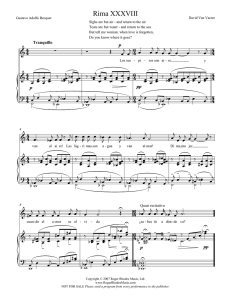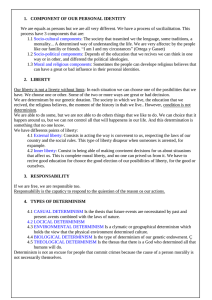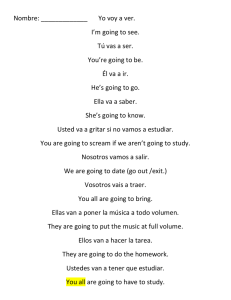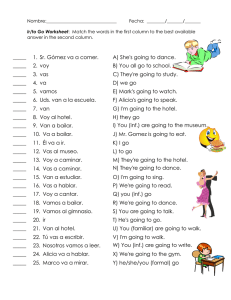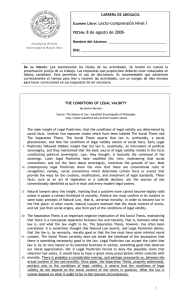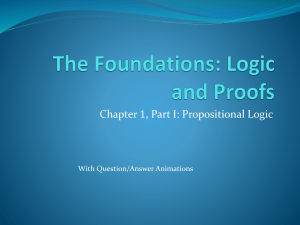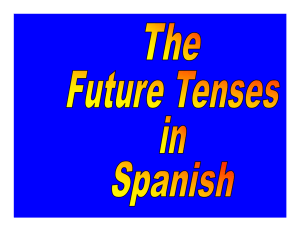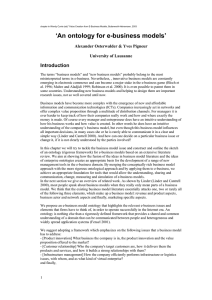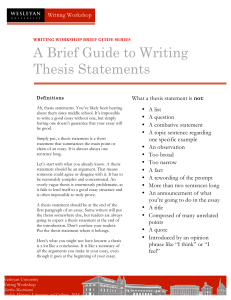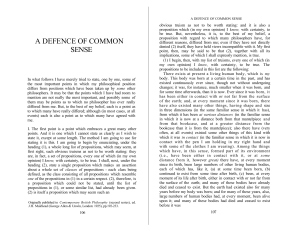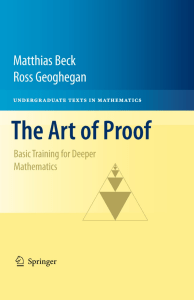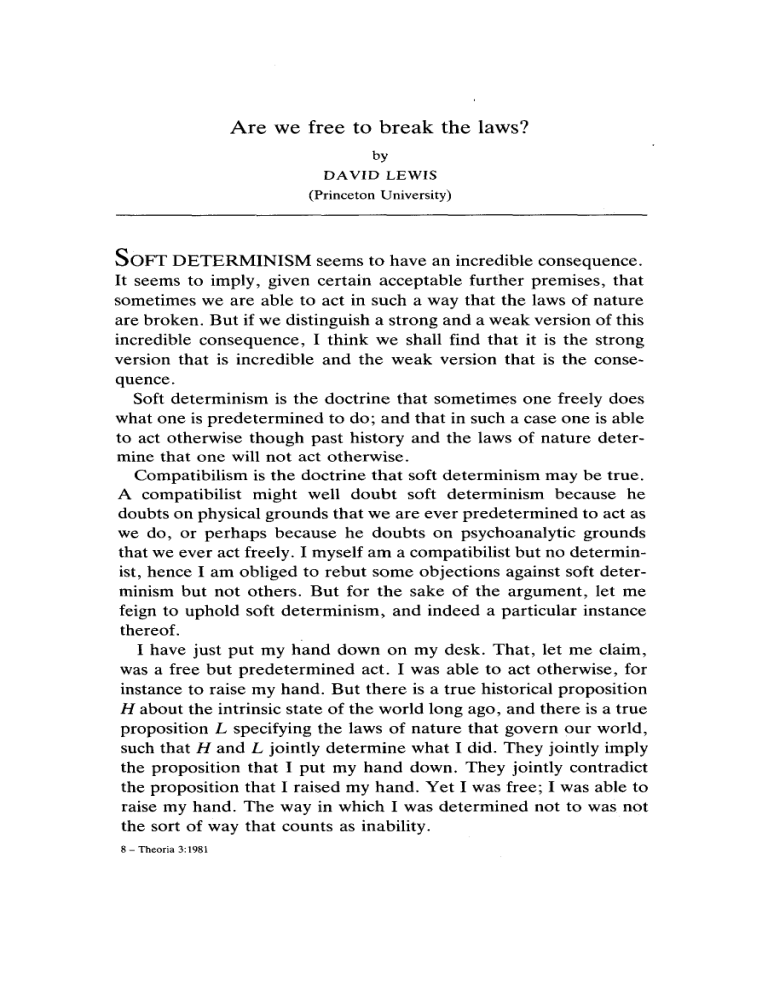
Are we free to break the laws? by DAVID LEWIS (Princeton University) S O F T DETERMINISM seems to have an incredible consequence. It seems to imply, given certain acceptable further premises, that sometimes we are able to act in such a way that the laws of nature are broken. But if we distinguish a strong and a weak version of this incredible consequence, I think we shall find that it is the strong version that is incredible and the weak version that is the consequence. Soft determinism is the doctrine that sometimes one freely does what one is predetermined to do; and that in such a case one is able to act otherwise though past history and the laws of nature determine that one will not act otherwise. Compatibilism is the doctrine that soft determinism may be true. A compatibilist might well doubt soft determinism because he doubts on physical grounds that we are ever predetermined to act as we do, or perhaps because he doubts on psychoanalytic grounds that we ever act freely. I myself am a compatibilist but no determinist, hence I am obliged to rebut some objections against soft determinism but not others. But for the sake of the argument, let me feign to uphold soft determinism, and indeed a particular instance thereof. I have just put my hand down on my desk. That, let me claim, was a free but predetermined act. I was able to act otherwise, for instance to raise my hand. But there is a true historical proposition H about the intrinsic state of the world long ago, and there is a true proposition L specifying the laws of nature that govern our world, such that H and L jointly determine what I did. They jointly imply the proposition that I put my hand down. They jointly contradict the proposition that I raised my hand. Yet I was free; I was able to raise my hand. The way in which I was determined not to was not the sort of way that counts as inability. 8 - Theoria 3 1981 114 DAVID LEWIS What if I had raised my hand? Then at least one of three things would have been true. Contradictions would have been true together; or the historical proposition H would not have been true; or the law proposition L would not have been true. Which? Here we need auxiliary premises; but since I accept the premises my opponent requires to make his case, we may proceed. Of our three alternatives, we may dismiss the first; for if I had raised my hand, there would still have been no true contradictions. Likewise we may dismiss the second; for if I had raised my hand, the intrinsic state of the world long ago would have been no different.’ That leaves the third alternative. If I had raised my hand, the law proposition L would not have been true. That follows by a principle of the logic of counterfactuals which is almost uncontroversial:2 A rnB v C v D, A m - B , A m - C , .‘.AbD. If L had not been true, that implies that some law of nature would have been broken, for L is a specification of the laws. That is not to say that anything would have been both a law and broken-that is a contradiction in terms if, as I suppose, any genuine law is at least an absolutely unbroken regularity. Rather, if L had not been true, something that is in fact a law, and unbroken, would have been broken, and no law. It would at best have been an almost-law. In short, as a (feigned) soft determinist, who accepts the requisite auxiliary premises and principle of counterfactual logic, I am committed to the consequence that if I had done what I was able to do-raise my hand-then some law would have been broken. “That is to say,” my opponent paraphrases, “you claim to be able to break the very laws of nature. And with so little effort! A marvelous power indeed! Can you also bend spoons?” Dinstinguo. My opponent’s paraphrase is not quite right. He has replaced the weak thesis that I accept with a stronger thesis that I join him in rejecting. The strong thesis is utterly incredible, but it is I argue for this in [4]. The inference is valid in any system that treats the conditional as a propositionally (or even sententially) indexed family of normal necessities, in the sense of Brian F. Chellas, ([11). ARE WE FREE TO BREAK THE LAWS? 115 no part of soft determinism. The weak thesis is controversial, to be sure, but a soft determinist should not mind being committed to it. The two theses are as follows. (Weak Thesis) I am able to do something such that, if I did it, a law would be broken. (Strong Thesis) I am able to break a law. To see the difference, consider not a marvelous ability to break a law but a commonplace ability to break a window. Perhaps I am able to throw a stone in a certain direction; and perhaps if I did, the stone would hit a certain window and the window would break. Then I am able to break a window. For starters: I am able to do something such that, if I did it, a window would be broken. But there is more to be said. I am able to do something such that, if I did it, my act would cause a window-breaking event. Or consider a commonplace ability to break a promise. Perhaps I am able to throw a stone; and perhaps if I did, I would break my promise never to throw a stone. Then I am able to break a promise. For starters: I am able to do something such that, if I did it, a promise would be broken. But there is more to be said. I am able to do something such that, if I did it, my act would itself be a promisebreaking event. Next, consider what really would be a marvelous ability to break a law-an ability I could not credibly claim. Suppose that I were able to throw a stone very, very hard. And suppose that if I did, the stone would fly faster than light, an event contrary to law. Then I really would be able to break a law. For starters: I would be able to do something such that, if I did it, a law would be broken. But there is more to be said. I would be able to do something such that, if I did it, my act would cause a law-breaking event. Or suppose that I were able to throw a stone so hard that in the course of the throw my own hand would move faster than light. Then again I would be able to break a law, regardless of what my act might cause. For starters: I would be able to do something such that, if I did it, a law would be broken. But there is more to be said. 116 DAVID LEWIS I would be able to do something such that, if I did it, my act would itself be a law-breaking event. If no act of mine either caused or was a window-, promise-, or law-breaking event, then I think it could not be true that I broke a window, a promise, or a law. Therefore I am able to break a window, a promise, or a law only if I am able to do something such that, if I did it, my act either would cause or would be a window-, promise-, or law-breaking event. Maybe my opponent will contend that according to soft determinism, there is another way of being able to break a law. But I see no reason to grant this contention. Now consider the disputed case. I am able to raise my hand, although it is predetermined that I will not. If I raised my hand, some law would be broken. I even grant that a law-breaking event would take place. (Here I use the present tense neutrally. I mean to imply nothing about when a law-breaking event would take place.) But is it so that my act of raising my hand would cause any lawbreaking event? Is it so that my act of raising my hand would itself be a law-breaking event? Is it so that any other act of mine would cause or would be a law-breaking event? If not, then my ability to raise my hand confers no marvelous ability to break a law, even though a law would be broken if I did it.3 Had I raised my hand, a law would have been broken beforehand. The course of events would have diverged from the actual Up to a point, my strategy here resembles that of Keith Lehrer ( [ 2 ] ,p. 199). Lehrer grants a weak thesis: the agent could have done somthing such that, if he had done it, there would have been a difference in either laws or history. He rejects, as I would, the step from that to a stronger thesis: the agent could have brought about a difference in laws or history. So far, so good. But Lehrer’s reason for rejecting the stronger thesis is one I canmt accept. His reason is this: it is false that if the agent had preferred that there be a difference in laws or history, there would have been a difference in laws or history. I say, first, that this conditional may not be false. Suppose the agent is predetermined to prefer that there be no difference; had he preferred otherwise, there would have been a difference. (Had anything been otherwise than it was predetermined to be, there would have been a difference in either laws or history.) And second, if this conditional is not false, that is not enough to make the stronger thesis true. There must be some other reason, different from the one Lehrer gives, why the stronger thesis is false. A R E WE FREE TO BREAK THE LAWS? 117 course of events a little while befare I raised my hand, and,at the point of divergence there would have been a law-breaking event-a divergence miracle, as I have called it ([4]). But this divergence miracle would not have been caused by my raising my hand. If anything, the causation would have been the other way around. Nor would the divergence miracle have been my act of raising my hand. That act was altogether absent from the actual course of events, so it cannot get under way until there is already some divergence. Nor would it have been caused by any other act of mine, earlier or later. Nor would it have been any other act of mine. Nor is there any reason to say that if I had raised my hand there would have been some other law-breaking event besides the divergence miracle; still less, that some other law-breaking event would have been caused by, or would have been, my act of raising my hand. To accommodate my hypothetical raising of my hand while holding fixed all that can and should be held fixed, it is necessary to suppose one divergence miracle, gratuitous to suppose any further law-breaking. Thus I insist that I was able to raise my hand, and I acknowledge that a law would have been broken had I done so, but I deny that I am therefore able to break a law. To uphold my instance of soft determinism, I need not claim any incredible powers. To uphold the compatibilism that I actually believe, I need not claim that such powers are even possible. I said that if I had raised my hand, the divergence miracle beforehand would not have been caused by my raising my hand. That seems right. But my opponent might argue ad horninem that according to my own analysis of causation ([3]), my raising my hand does turn out to cause the divergence miracle. The effect would precede the cause, but I do not object to that. We seem to have the right pattern of counterfactual dependence between distinct events: (1) if I had raised my hand, the divergence miracle would have occurred, but (2) if I had not raised my hand, it would not have occurred. I reply that we do not have this required pattern, nor would we have had it if I had raised my hand. Therefore I am safe in denying that the miracle would have been caused by my act. 118 DAVID LEWIS We do not have the pattern because (1) is false. What is true is only that if I had raised my hand, then some or other divergence miracle would have occurred. There is no particular divergence miracle that definitely would have occurred, since the divergence might have happened in various ways4 If I had raised my hand, (1) would have been true. But we still would not have had the right pattern, because in that case (2) would have been false. Consider a counterfactual situation in which a divergence miracle beforehand has allowed me to raise my hand. Is it so, frbm the standpoint of that situation, that if I had not raised my hand, the miracle would not have taken place? No; the miracle might have taken place, only to have its work undone straightway by a second miracle. (Even in this doubly counterfactual context, when I speak of a miracle I mean a violation of the actual laws.) What is true, at most, is that if I had not raised my hand, then the first miracle might not have taken place. My incompatibilist opponent is a creature of fiction, but he has his prototypes in real life. He is modelled partly on Peter van Inwagen ( [ 5 ] ,[6], [7]) and partly on myself when I first worried about van Inwagen’s argument against compatibilism. He definitely is not van Inwagen; he does not choose his words so carefully. Still I think that for all his care, van Inwagen is in the same boat with my fictitious opponent. Van Inwagen’s argument runs as follows, near enough. (I recast it as a reductio against the instance of soft determinism that I feign to uphold.) I did not raise my hand; suppose for reductio that I could have raised my hand, although determinism is true. Then it follows, given four premises that I cannot question, that I could have rendered false the conjunction H L of a certain historical proposition H about the state of the world before my birth and a certain Cf. [4], p. 463. At this point I am relying on contingent features of the world as we suppose it to be; as Allen Hazen has pointed out to me, we can imagine a world of discrete processes at which one divergent history in which I raise my hand clearly takes less of a miracle than any of its rivals. I think this matters little, since the task of compatibilism is to show how freedom and determinism might coexist at a world that might, for all we know, be ours. ARE WE FREE TO BREAK THE LAWS? 119 law proposition L. If so, then I could have rendered L false. (Premise 5.) But I could not have rendered L false. (Premise 6.) This refutes our supposition. To this I reply that Premise 5 and Premise 6 are not both true. Which one is true depends on whan van Inwagen means by “could have rendered false”. It does not matter what “could have rendered false” means in ordinary language; van Inwagen introduced the phrase as a term of art. It does not even matter what meaning van Inwagen gave it. What matters is whether we can give it any meaning that would meet his needs-any meaning that would make all his premises defensible without circularity. I shall consider two meanings. I think there is nothing in van Inwagen’s text to suggest any third meaning that might work better than these two.5 First, a preliminary definition. Let us say that an event would falsify a proposition iff, necessarily, if that event occurs then that proposition is false. For instance, an event consisting of a stone’s flying faster than light would falsify a law. So would an act of throwing in which my hand moves faster than light. So would a divergence miracle. But my act of throwing a stone would not itself falsify the proposition that the window in the line of fire remains intact; all that is true is that my act would cause another event that would falsify that proposition. My act of raising my hand would falsify any sufficiently inclusive conjunction of history and law. But it would not itself falsify any law-not if all the requisite lawbreaking were over and done with beforehand. All that is true is that my act would be preceded by another event-the divergence miracle-that would falsify a law. Van Inwagen has indicated (personal communication, 1981) that he would adopt a third meaning for “could have rendered false”, different from both of the meanings that I discuss here. His definition is roughly as follows: an agent could have rendered a proposition false iff he could have arranged things in a certain way, such that his doing so, plus the whole truth about the past, together strictly imply the falsehood of the proposition. On this definition, Premise 6 simply says that I could not have arranged things in any way such that I was predetermined not to arrange things in that way. It is uninstructive to learn that the soft determinist is committed to denying Premise 6 thus understood. 120 DAVID LEWIS Let us say that I could have rendered a proposition false in the weak sense iff I was able to do something such that, if I did it, the proposition would have been falsified (though not necessarily by my act, or by any event caused by my act). And let us say that I could have rendered a proposition false in the strong sense iff I was able to do something such that, if I did it, the proposition would have been falsified either by my act itself or by some event caused by my act. The Weak Thesis, which as a soft determinist I accept, is the thesis that I could have rendered a law false in the weak sense. The Strong Thesis, which I reject, is the thesis that I could have rendered a law false in the strong sense. The first part of van Inwagen’s argument succeeds whichever sense we take. If I could have raised my hand despite the fact that determinism is true and I did not raise it, then indeed it is true both in the weak sense and in the strong sense that I could have rendered false the conjunction H L of history and law. But I could have rendered false the law proposition L in the weak sense, though I could not have rendered L false in the strong sense. So if we take the weak sense throughout the argument, then I deny Premise 6. If instead we take the strong sense, then I deny Premise 5. Van Inwagen supports both premises by considering analogous cases. I think the supporting arguments fail because the cases produced are not analogous: they are cases in which the weak and strong senses do not diverge. In support of Premise 6, he invites us to reject the supposition that a physicist could render a law false by building and operating a machine that would accelerate protons to twice the speed of light. Reject that supposition by all means; but that does nothing to support Premise 6 taken in the weak sense, for the rejected supposition is that the physicist could render a law false in the strong sense. In support of Premise 5 , he invites us to reject the supposition that a traveler could render false a conjunction of a historical proposition and a proposition about his future travels otherwise than by rendering false the nonhistorical conjunct. Reject that supposition by all means, but that does nothing to support Premise 5 taken in the strong sense. Given that one could render false, in the strong sense, a conjunction of historical and nonhistori- ARE WE FREE TO BREAK THE LAWS? 121 cal propositions (and given that, as in the cases under consideration, there is no question of rendering the historical conjunct false by means of time travel or the like), what follows? Does it follow that one could render the nonhistorical conjunct false in the strong sense? That is what would support Premise 5 in the strong sense. Or does it only follow, as I think, that one could render the nonhistorical conjunct false in at least the weak sense? The case of the traveler is useless in answering that question, since if the traveler could render the proposition about his future travels false in the weak sense, he could also render it false in the strong sense. References [l] CHELLAS, B. F. “Basic conditional logic”. Journal of philosophical logic, vol. 4 (1975), pp. 133-153. [2] LEHRER,K. “Preferences, conditionals and freedom”. In Peter van Inwagen, ed., Time and cause. Dordrecht: Reidel, 1980. [3] LEWIS,D. “Causation”. Journal of Philosophy, vol. 70 (1973), pp. 556567. [4] LEWIS,D. “Counterfactual dependence and time’s arrow”. Nocis, vol. 13 (1979), pp. 455-476. [ 5 ] VAN INWAGEN, P. “A formal approach to the problem of free will and determinism”. Theoria, vol. 40 (1974), pp. 9-22. [6] VAN INWAGEN, P. “The incompatability of free will and determinism”. Philosophical studies, vol. 27 (1975), pp. 185-199. [7] VAN INWAGEN, P. “Reply to Narveson”. Philosophical studies, vol. 32 (1977), pp. 89-98, Received May 6, 1981.
